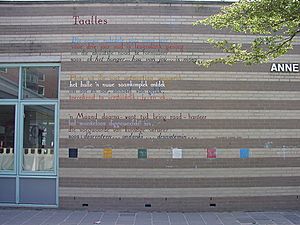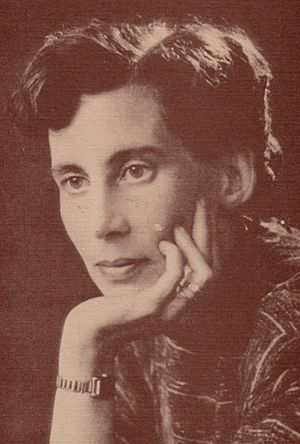Elisabeth Eybers facts for kids

Elisabeth Françoise Eybers (born February 26, 1915 – died December 1, 2007) was a famous South African poet. She mostly wrote her poems in Afrikaans. She also translated some of her own work into English.
Contents
Early Life and Education
Elisabeth Eybers was born in Klerksdorp, which is in Transvaal. She grew up in a town called Schweizer-Reneke. Her father was a Dutch Reformed minister there.
She finished high school when she was 16 years old. After that, she went to the University of the Witwatersrand. She studied for a Bachelor of Arts degree and passed with high honors.
Becoming a Poet
After finishing university, Elisabeth became a journalist. In 1937, she married a businessman named Albert Wessels. They had three daughters and one son together.
Elisabeth Eybers was part of a group of writers called the Dertigers. In 1943, she made history by becoming the first Afrikaans woman to win the Hertzog Prize for poetry. She won this important award again in 1971.
Her Poetry Collections
Elisabeth Eybers published her first book of poems, Belydenis in die Skemering (which means "Confession at twilight"), in 1936. Her second book, Die Stil Avontuur ("The silent adventure"), came out in 1939. This collection was mostly about being a mother.
In 1945, she published Die Vrou en ander verse (The woman and other poems). Her fourth poetry book, Die Ander Dors (The other thirst), was published in 1946.
Many more poetry collections followed regularly, including:
- Tussensang (In-between song), 1950
- Helder Halfjaar (Bright half-year), 1956
- Versamelde Gedigte (Collected poems), 1957
- Neerslag (Precipitation), 1958
- Balans (Balance), 1962
- Onderdak (Under shelter), 1965
- Kruis of Munt (Head or tail), 1973
Later in her career, she published books like Verbruikersverse/Consumer's verse (1997), which was written in two languages, and Winter-surplus (1999).
Global Recognition
Elisabeth Eybers' poems were very popular. They were translated into many languages, including German, French, Italian, and Hebrew.
A South African composer named Cromwell Everson even created a song using her poem called "Die Vreemde Dae."
Later Life and Legacy
After her divorce in 1961, Elisabeth Eybers moved to Amsterdam, in the Netherlands. She lived there until her passing in 2007. She was buried at the Zorgvlied cemetery.
Her work received many other awards in both South Africa and the Netherlands. These included the Constantijn Huygens Prize in 1978 and the P. C. Hooft Award in 1991. Elisabeth Eybers is remembered as a very important poet in Afrikaans literature.
See also
 In Spanish: Elisabeth Eybers para niños
In Spanish: Elisabeth Eybers para niños
 | Toni Morrison |
 | Barack Obama |
 | Martin Luther King Jr. |
 | Ralph Bunche |


